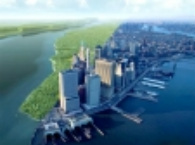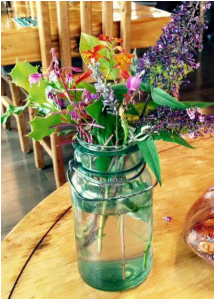
Sanderson's renderings show us the original natural wealth of this island that today is so densely populated and concretized. His work is not meant to make a judgment about the Manhattan of today vs the Mannahatta of centuries ago. The work does, however, provide food for thought about how humans might live more sustainably in the future - it portrays one option of a dense, tall city that houses millions of people side-by-side with farmland and woods that have been restored. The landscape architecture students in class tonight suggested that this might be one way to handle things if transportation between large cities and far-off farmlands, or between suburbs and food sources, becomes too costly for the average person or community.
As we talked tonight about what it might be like to move from a relatively large suburban dwelling with a green yard into a super-high-rise dwelling with smaller residences and lots of people close-by, we bumped up against uncomfortable feelings. We often associate the "American dream" with independence, large spaces, privacy, private ownership, freedom to move and be at will. This dream is supported by our institutions and our economy, by the advertisements coming from Madison Avenue. What would it be like to live so differently? (I know that many people already do live this way!)
I don't have answers for anyone else, but I do recognize my own discomfort when my "space" is cramped. As I traveled to West Virginia for the March on Blair Mountain, it occurred to me that I was moving a little outside of my comfort zone. For a couple of days, I would be following someone else's (strangers') schedules for activities, mealtimes, transportation, and so on. I would be outdoors for much of the time, with no car nearby in case it rained, or I got hungry, or I got bored. Moving into even the one day of marching made me realize how protective I am of my own time and space and movement - such a privileged and sheltered life I lead.
So how was it? To be honest, it probably helped that I knew the experience would last only a day or so, that there was an end-point in sight - that helped for sure. I have to say, however, that the mild discomforts that I did experience, the heat, the waiting, the fatigue (good grief, what a wuss I sound like!) were far outweighed by my experience of being part of something bigger than myself and by watching all of the wonderful people who came together for this cause.
I occasionally get emails from a Pittsburgh environmental group - Transition Pittsburgh - one of many local groups of very cool people who are trying to better the world one garden, one project at a time. Today, I read about Chris Condello, a resident of Wilkinsburg, a pretty poor community nearby - poor in economic terms, that is. For example, on Chris' block, 10 out of 22 houses are abandoned. He and others are transforming this community vacant lot by vacant lot - planting vegetables and flowers in a variety of public spaces, gathering the neighborhood kids in and teaching them how to wield a spade and to sell the lettuce they grow. Wilkinsburg, in the middle of Pittsburgh - maybe not super-high-rise buildings but definitely urban - greening up with all hands on board.
I think about Chris' work - it takes courage to step out into the public, out of our private spaces, to engage with relative strangers and create something new, something that has no certain outcome. It takes courage to offer help to and to ask for help from people you don't yet know well. I hope to visit the Whitney Avenue Garden in Wilkinsburg and to talk with Chris about the project. I wonder if projects like this can be transformed for Sanderson's futuristic Manhattan - the extra tall city with farmland all around. Can this kind of community-building work there? Can we get used to living closer together, sacrificing some personal space and time for the common good? Would our lives have a different kind of meaning - a different definition of "the good life" or "happiness" under these circumstances? What do you think?


 RSS Feed
RSS Feed
